专题十四 非谓语动词
- 格式:doc
- 大小:179.50 KB
- 文档页数:12
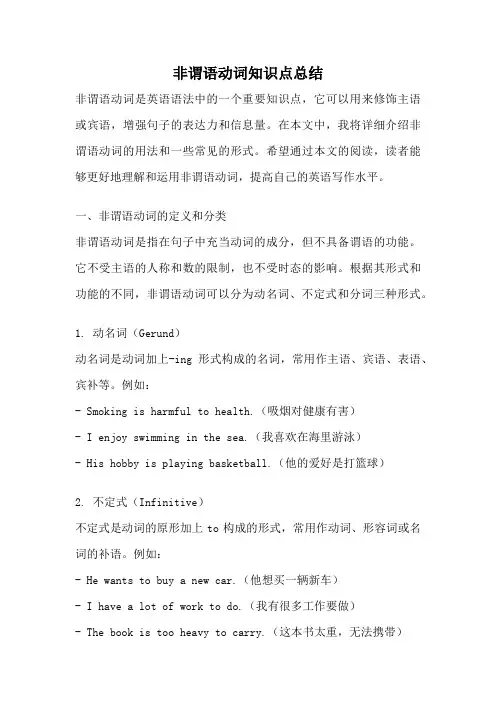
非谓语动词知识点总结非谓语动词是英语语法中的一个重要知识点,它可以用来修饰主语或宾语,增强句子的表达力和信息量。
在本文中,我将详细介绍非谓语动词的用法和一些常见的形式。
希望通过本文的阅读,读者能够更好地理解和运用非谓语动词,提高自己的英语写作水平。
一、非谓语动词的定义和分类非谓语动词是指在句子中充当动词的成分,但不具备谓语的功能。
它不受主语的人称和数的限制,也不受时态的影响。
根据其形式和功能的不同,非谓语动词可以分为动名词、不定式和分词三种形式。
1. 动名词(Gerund)动名词是动词加上-ing形式构成的名词,常用作主语、宾语、表语、宾补等。
例如:- Smoking is harmful to health.(吸烟对健康有害)- I enjoy swimming in the sea.(我喜欢在海里游泳)- His hobby is playing basketball.(他的爱好是打篮球)2. 不定式(Infinitive)不定式是动词的原形加上to构成的形式,常用作动词、形容词或名词的补语。
例如:- He wants to buy a new car.(他想买一辆新车)- I have a lot of work to do.(我有很多工作要做)- The book is too heavy to carry.(这本书太重,无法携带)3. 分词(Participle)分词是动词的-ing形式(现在分词)或-ed、-en等形式(过去分词)构成的形容词,常用作定语、状语或补语。
例如:- The running water is very clear.(流动的水非常清澈)- The broken vase has been repaired.(打破的花瓶已经修好了)- We were surprised by the exciting news.(令人兴奋的消息让我们感到惊讶)二、非谓语动词的用法非谓语动词在句子中具有独立的语法功能,可以用来修饰名词、代词、动词、形容词和副词等,以及构成复合句的各种从句。
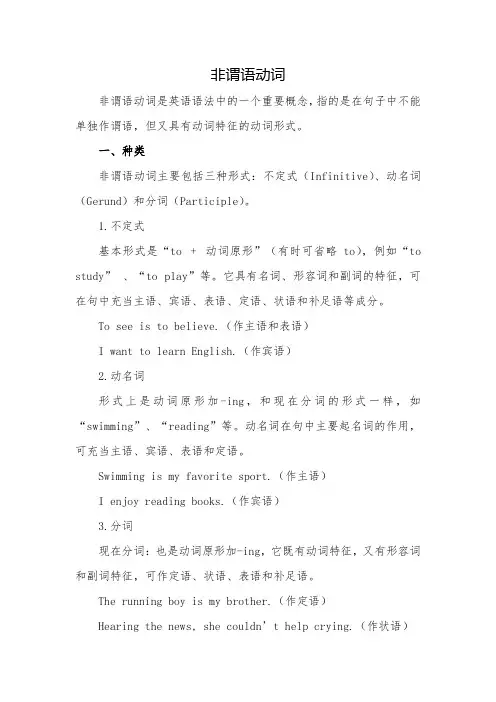
非谓语动词非谓语动词是英语语法中的一个重要概念,指的是在句子中不能单独作谓语,但又具有动词特征的动词形式。
一、种类非谓语动词主要包括三种形式:不定式(Infinitive)、动名词(Gerund)和分词(Participle)。
1.不定式基本形式是“to + 动词原形”(有时可省略to),例如“to study”、“to play”等。
它具有名词、形容词和副词的特征,可在句中充当主语、宾语、表语、定语、状语和补足语等成分。
To see is to believe.(作主语和表语)I want to learn English.(作宾语)2.动名词形式上是动词原形加-ing,和现在分词的形式一样,如“swimming”、“reading”等。
动名词在句中主要起名词的作用,可充当主语、宾语、表语和定语。
Swimming is my favorite sport.(作主语)I enjoy reading books.(作宾语)3.分词现在分词:也是动词原形加-ing,它既有动词特征,又有形容词和副词特征,可作定语、状语、表语和补足语。
The running boy is my brother.(作定语)Hearing the news, she couldn’t help crying.(作状语)过去分词:通常是动词原形加-ed(规则变化)或有其特殊的不规则变化形式,如“broken”、“written”等。
过去分词常表示被动或完成的意义,同样能充当定语、状语、表语和补足语等成分。
The broken cup is on the table.(作定语)Given more time, I can do it better.(作状语)二、用法区别1.作主语时不定式作主语常表示具体的某一次动作或行为,常用“It + be + 形容词+ (for/of sb.) + to do sth.”这样的结构,It is important for us to learn English well.动名词作主语往往表示抽象的、一般性的行为或概念。
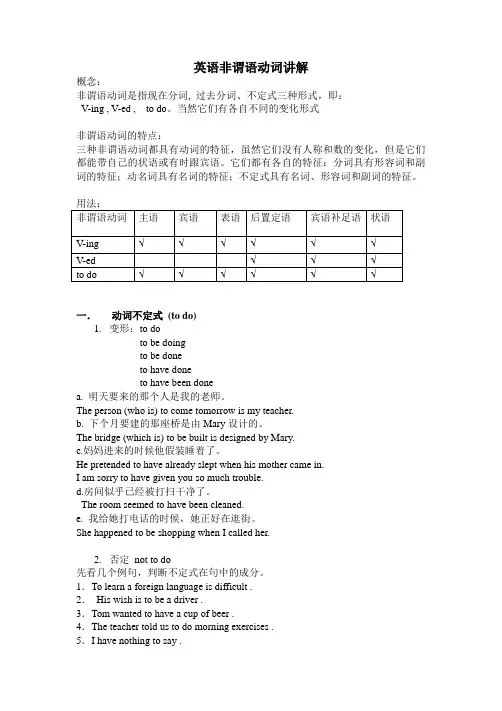
英语非谓语动词讲解概念:非谓语动词是指现在分词, 过去分词、不定式三种形式,即:V-ing , V-ed , to do。
当然它们有各自不同的变化形式非谓语动词的特点:三种非谓语动词都具有动词的特征,虽然它们没有人称和数的变化,但是它们都能带自己的状语或有时跟宾语。
它们都有各自的特征:分词具有形容词和副词的特征;动名词具有名词的特征;不定式具有名词、形容词和副词的特征。
一.动词不定式(to do)1.变形:to doto be doingto be doneto have doneto have been donea. 明天要来的那个人是我的老师。
The person (who is) to come tomorrow is my teacher.b. 下个月要建的那座桥是由Mary设计的。
The bridge (which is) to be built is designed by Mary.c.妈妈进来的时候他假装睡着了。
He pretended to have already slept when his mother came in.I am sorry to have given you so much trouble.d.房间似乎已经被打扫干净了。
The room seemed to have been cleaned.e. 我给她打电话的时候,她正好在逛街。
She happened to be shopping when I called her.2.否定not to do先看几个例句,判断不定式在句中的成分。
1.To learn a foreign language is difficult .2.His wish is to be a driver .3.Tom wanted to have a cup of beer .4.The teacher told us to do morning exercises .5.I have nothing to say .6.They went to see their aunt .7.It’s easy to see their aunt.8.I don’t know what to do next .9.I heard them make a noise .1.动词不定式作主语。
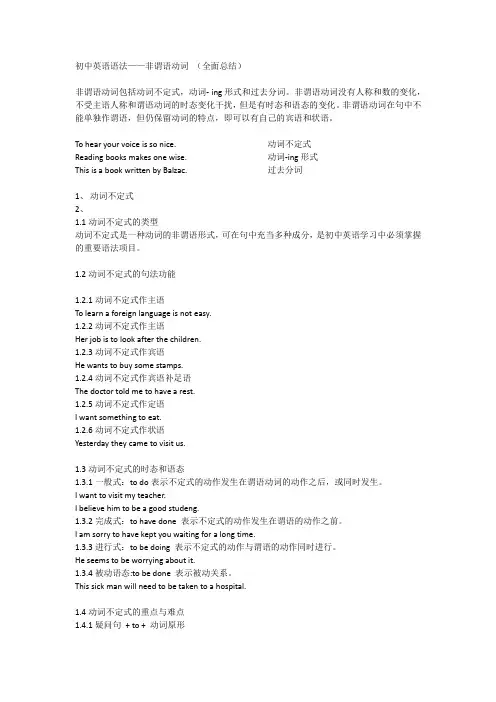
初中英语语法——非谓语动词(全面总结)非谓语动词包括动词不定式,动词- ing形式和过去分词。
非谓语动词没有人称和数的变化,不受主语人称和谓语动词的时态变化干扰,但是有时态和语态的变化。
非谓语动词在句中不能单独作谓语,但仍保留动词的特点,即可以有自己的宾语和状语。
To hear your voice is so nice. 动词不定式Reading books makes one wise. 动词-ing形式This is a book written by Balzac. 过去分词1、动词不定式2、1.1动词不定式的类型动词不定式是一种动词的非谓语形式,可在句中充当多种成分,是初中英语学习中必须掌握的重要语法项目。
1.2动词不定式的句法功能1.2.1动词不定式作主语To learn a foreign language is not easy.1.2.2动词不定式作主语Her job is to look after the children.1.2.3动词不定式作宾语He wants to buy some stamps.1.2.4动词不定式作宾语补足语The doctor told me to have a rest.1.2.5动词不定式作定语I want something to eat.1.2.6动词不定式作状语Yesterday they came to visit us.1.3动词不定式的时态和语态1.3.1一般式:to do表示不定式的动作发生在谓语动词的动作之后,或同时发生。
I want to visit my teacher.I believe him to be a good studeng.1.3.2完成式:to have done 表示不定式的动作发生在谓语的动作之前。
I am sorry to have kept you waiting for a long time.1.3.3进行式:to be doing 表示不定式的动作与谓语的动作同时进行。
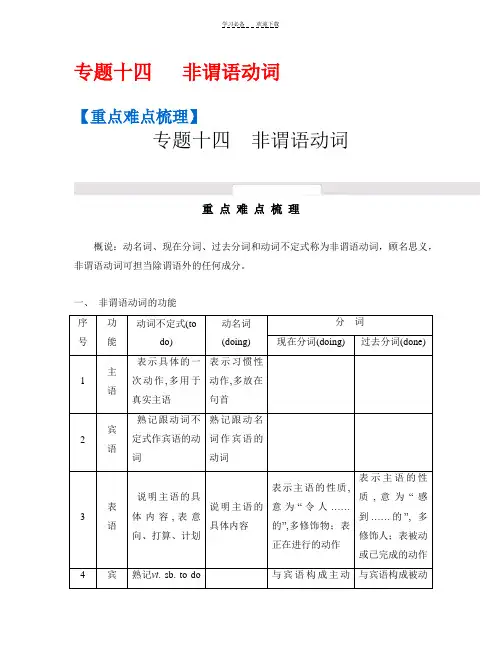
专题十四非谓语动词【重点难点梳理】专题十四非谓语动词重点难点梳理概说:动名词、现在分词、过去分词和动词不定式称为非谓语动词,顾名思义,非谓语动词可担当除谓语外的任何成分。
一、非谓语动词的功能续表二、非谓语动词的时态和语态三、动词不定式和动名词作宾语的比较四、非谓语动词作宾语补足语的区别五、现在分词和过去分词的用法对比六、特别提示【梯度升级训练】梯度升级训练(见学生用书P269—P270)一、用所给动词的适当形式填空1. turn(1) Turn to the left, and you’ll see the bus stop.(2) Turning to the left, you’ll see the bus stop.2. tell(1) Having been told/Told many times, he still couldn’t understand the question.(2) Having told me the bad news, he went out of the room sadly.3. give(1) Nothing could make us give up the hope.(2) Crusoe made a candle to give light.4. examine(1) I want to examine your bag.(2) Your eyes want examining/to be examined.(3) I want my eyes to be examined/examined this afternoon.5. get(1) What’s the way Smith thought of to get enough money to buy the new house?(2) I’m thinking of getting Tom to repair my bike.6. smoke(1) We don’t allow smoking in the office because of the public health.(2) We don’t allow anyone to smoke in the office because of the public health. 7. listen(1) My little brother enjoys nothing but listening to music.(2) My little brother does nothing all day but listen to music.(3) My little brother had no choice but to listen to me.8. hear(1) The teacher raised his voice in order to make himself heard.(2) The teacher raised his voice in order to make his students hear what he said.(3) The children talked so loudly at dinner table that I had to struggle to be heard.9. discuss(1) The problem is worth discussing again.(2) The problem is worthy to be discussed again.(3) The problem is worthy of being discussed again.10. get, fail(1) It passes right through their bodies, only getting a little thicker and sweeter.(2) He worked harder only to fail again.11. ask(1) No one can stop us asking questions.(2) We stopped to ask a schoolboy the way to the teachers’ office.12. face(1) Faced with so much trouble, we failed to complete the task on time.(2) Nearly every great building in Beijing was built facing south.13. hold(1) The parents’ meeting to be held next Saturday is very important.(2) The 29th Olympic Games held in Beijing was a great success.(3) The parents’ meeting being held in our school now is important.14. make(1) To make this cake, you need 2 eggs, 175g sugar and 175g flour.(2) Having made the cake, she got down to cooking some milk.(3) I lost my way in complete darkness and, to make matters worse, it began to rain. 15. clean(1) The room is so dirty that I can’t help cleaning it.(2) I’m too busy, so I can’t help (to) clean the room.(3) The room is too dirty. I can’t help but clean it.16. type(1) I knew I would be busy today, so I had my paper typed last night.(2) I can’t go with you. I have some papers to type.(3) Do you have any papers to be typed, Sir?17. settle(1) With many problems to settle, the president will have a hard time.(2) With the problem settled, he had a good sleep last night.(3) With the secretary settling the problem, he is reading the newspaper leisurely in the office.18. cheat(1) “I ever saw him cheat an old man of 500 yuan,” he said to the police.(2) He was seen to cheat an old man of 500 yuan in the street yesterday.(3) Unluckily, the policeman saw him cheating an old man around the corner.19. The film was disappointing and all of us were very disappointed. (disappoint)20. At the beginning of class, the noise of desks being opened and closed(open and close) could be heard outside the classroom.二、语法填空A long time ago, there was a huge huge apple tree. A little boy came 1(sing) and jumping and lay under it every day. He would climb to the tree top, eat the apples, and take a nap in the shade. He loved the tree and the tree loved to play with him.In the 2(follow) years, the boy came and cut the branches 3(build) a house, used the trunk on which he used to climb 4(make) a boat and then never showed up for a long time.Finally, 5(be) tired of travelling, the boy returned. “Sorry, my boy, but I don’t have anything for you anymore. No more apples for you...” the tree said. “I don’t have teeth to bite. 6(eat) apples no longer appeals to me,” the boy replied. “No more trunk for you to climb on.” “I am too old 7(climb) now,” the boy said. “I really can’t give you anything...the only thing left is my dying roots,” the tree said with tears. “I don’t need much now, just a place 8(rest). I’m tired after 9(travel) all these years,” the boy replied. “Good! Old tree roots are the best place to lean on and rest. Come, come, sit down with me and rest.” The boy sat down and the tree was glad, 10(smile) with tears.本文是一篇记叙文。
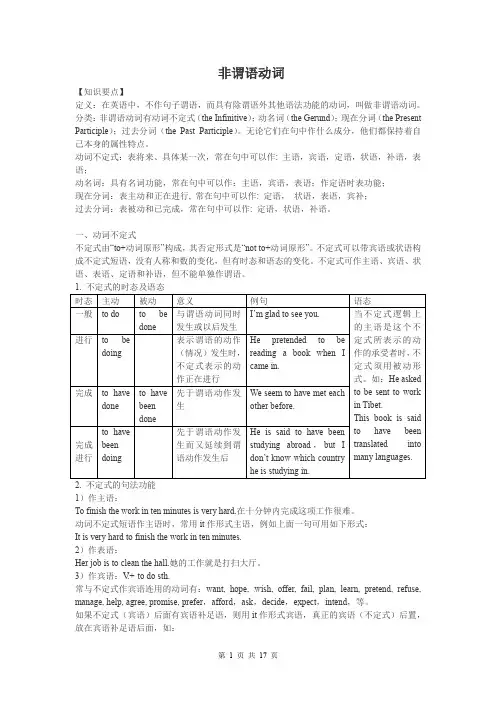
非谓语动词【知识要点】定义:在英语中,不作句子谓语,而具有除谓语外其他语法功能的动词,叫做非谓语动词。
分类:非谓语动词有动词不定式(the Infinitive);动名词(the Gerund);现在分词(the Present Participle);过去分词(the Past Participle)。
无论它们在句中作什么成分,他们都保持着自己本身的属性特点。
动词不定式:表将来、具体某一次,常在句中可以作: 主语,宾语,定语,状语,补语,表语;动名词:具有名词功能,常在句中可以作:主语,宾语,表语;作定语时表功能;现在分词:表主动和正在进行, 常在句中可以作: 定语,状语,表语,宾补;过去分词:表被动和已完成,常在句中可以作: 定语,状语,补语。
一、动词不定式不定式由“to+动词原形”构成,其否定形式是“not to+动词原形”。
不定式可以带宾语或状语构成不定式短语,没有人称和数的变化,但有时态和语态的变化。
不定式可作主语、宾语、状语、表语、定语和补语,但不能单独作谓语。
2. 不定式的句法功能1)作主语:To finish the work in ten minutes is very hard.在十分钟内完成这项工作很难。
动词不定式短语作主语时,常用it作形式主语,例如上面一句可用如下形式:It is very hard to finish the work in ten minutes.2)作表语:Her job is to clean the hall.她的工作就是打扫大厅。
3)作宾语:V.+ to do sth.常与不定式作宾语连用的动词有:want, hope, wish, offer, fail, plan, learn, pretend, refuse, manage, help, agree, promise, prefer,afford,ask,decide,expect,intend,等。
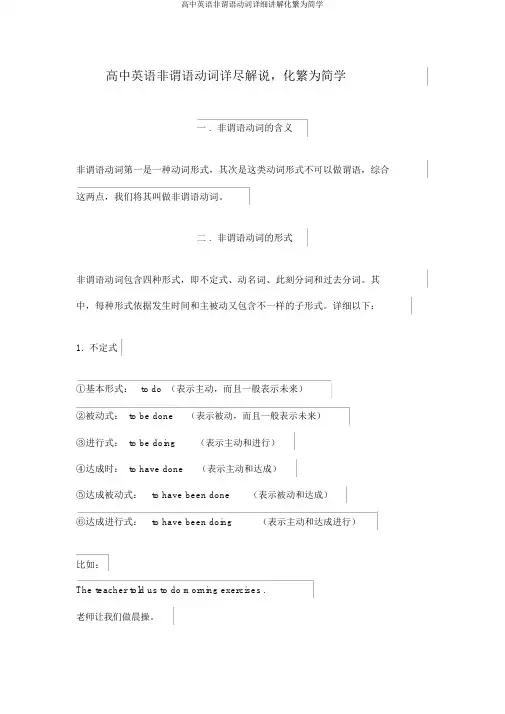
高中英语非谓语动词详尽解说,化繁为简学一 . 非谓语动词的含义非谓语动词第一是一种动词形式,其次是这类动词形式不可以做谓语,综合这两点,我们将其叫做非谓语动词。
二 . 非谓语动词的形式非谓语动词包含四种形式,即不定式、动名词、此刻分词和过去分词。
其中,每种形式依据发生时间和主被动又包含不一样的子形式。
详细以下:1.不定式①基本形式:to do (表示主动,而且一般表示未来)②被动式: to be done(表示被动,而且一般表示未来)③进行式: to be doing(表示主动和进行)④达成时: to have done(表示主动和达成)⑤达成被动式:to have been done(表示被动和达成)⑥达成进行式:to have been doing(表示主动和达成进行)比如:The teacher told us to do morning exercises .老师让我们做晨操。
The car to be bought is for his sister.要买的这辆车是给他的姐姐的。
She pretended to be reading when the teacher came into the classroom.老师进来时,她假装正在念书。
The thief is said to have escaped.听说小偷已经逃跑了。
The thief is said to have been arrested.听说小偷已经被抓住了。
She is said to have been working in the factory over the last 20 years.听说在过去的20 年里,她向来在这家工厂工作。
2.动名词①基本形式:doing(表示主动)②被动式: being done(表示被动)③达成式: having done(表示主动和达成)④达成被动式:having been done(表示被动和达成)比如:Travelling in space by ordinary people will be common in the future.在未来,一般人在太空旅游将会是广泛的事情。

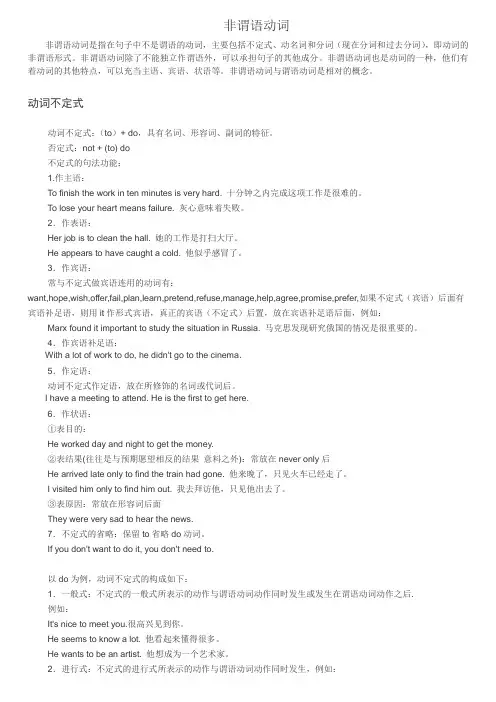
非谓语动词非谓语动词是指在句子中不是谓语的动词,主要包括不定式、动名词和分词(现在分词和过去分词),即动词的非谓语形式。
非谓语动词除了不能独立作谓语外,可以承担句子的其他成分。
非谓语动词也是动词的一种,他们有着动词的其他特点,可以充当主语、宾语、状语等。
非谓语动词与谓语动词是相对的概念。
动词不定式动词不定式:(to)+ do,具有名词、形容词、副词的特征。
否定式:not + (to) do不定式的句法功能:1.作主语:To finish the work in ten minutes is very hard. 十分钟之内完成这项工作是很难的。
To lose your heart means failure. 灰心意味着失败。
2.作表语:Her job is to clean the hall. 她的工作是打扫大厅。
He appears to have caught a cold. 他似乎感冒了。
3.作宾语:常与不定式做宾语连用的动词有:want,hope,wish,offer,fail,plan,learn,pretend,refuse,manage,help,agree,promise,prefer,如果不定式(宾语)后面有宾语补足语,则用it作形式宾语,真正的宾语(不定式)后置,放在宾语补足语后面,例如:Marx found it important to study the situation in Russia. 马克思发现研究俄国的情况是很重要的。
4.作宾语补足语:With a lot of work to do, he didn't go to the cinema.5.作定语:动词不定式作定语,放在所修饰的名词或代词后。
I have a meeting to attend. He is the first to get here.6.作状语:①表目的:He worked day and night to get the money.②表结果(往往是与预期愿望相反的结果意料之外):常放在never only后He arrived late only to find the train had gone. 他来晚了,只见火车已经走了。
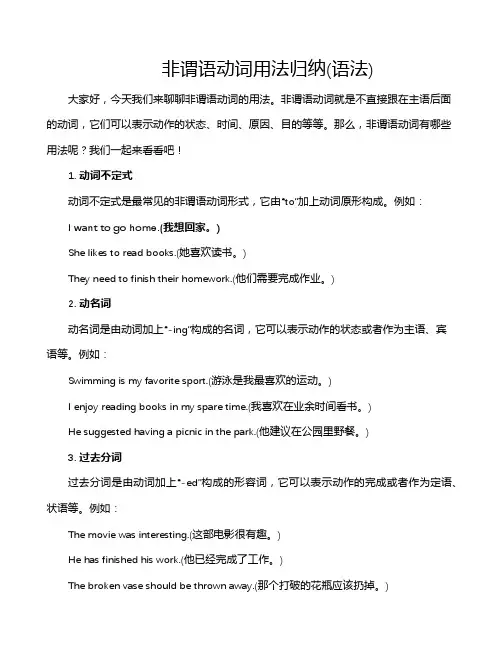
非谓语动词用法归纳(语法)大家好,今天我们来聊聊非谓语动词的用法。
非谓语动词就是不直接跟在主语后面的动词,它们可以表示动作的状态、时间、原因、目的等等。
那么,非谓语动词有哪些用法呢?我们一起来看看吧!1. 动词不定式动词不定式是最常见的非谓语动词形式,它由“to”加上动词原形构成。
例如:I want to go home.(我想回家。
)She likes to read books.(她喜欢读书。
)They need to finish their homework.(他们需要完成作业。
)2. 动名词动名词是由动词加上“-ing”构成的名词,它可以表示动作的状态或者作为主语、宾语等。
例如:Swimming is my favorite sport.(游泳是我最喜欢的运动。
)I enjoy reading books in my spare time.(我喜欢在业余时间看书。
)He suggested having a picnic in the park.(他建议在公园里野餐。
)3. 过去分词过去分词是由动词加上“-ed”构成的形容词,它可以表示动作的完成或者作为定语、状语等。
例如:The movie was interesting.(这部电影很有趣。
)He has finished his work.(他已经完成了工作。
)The broken vase should be thrown away.(那个打破的花瓶应该扔掉。
)4. 现在分词现在分词是由动词加上“-ing”构成的形容词,它可以表示动作正在进行或者作为定语、状语等。
例如:Walking in the park is good for your health.(在公园里散步对身体有好处。
)She is studying English at the moment.(她现在正在学英语。
)The running water sounds very soothing.(流水声听起来很舒缓。
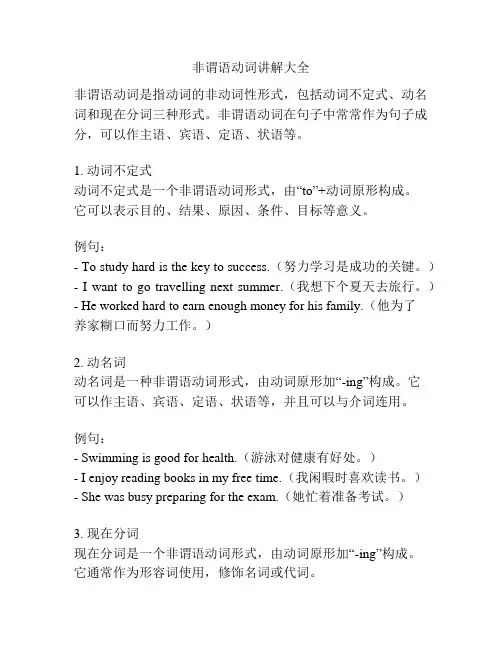
非谓语动词讲解大全非谓语动词是指动词的非动词性形式,包括动词不定式、动名词和现在分词三种形式。
非谓语动词在句子中常常作为句子成分,可以作主语、宾语、定语、状语等。
1. 动词不定式动词不定式是一个非谓语动词形式,由“to”+动词原形构成。
它可以表示目的、结果、原因、条件、目标等意义。
例句:- To study hard is the key to success.(努力学习是成功的关键。
)- I want to go travelling next summer.(我想下个夏天去旅行。
)- He worked hard to earn enough money for his family.(他为了养家糊口而努力工作。
)2. 动名词动名词是一种非谓语动词形式,由动词原形加“-ing”构成。
它可以作主语、宾语、定语、状语等,并且可以与介词连用。
例句:- Swimming is good for health.(游泳对健康有好处。
)- I enjoy reading books in my free time.(我闲暇时喜欢读书。
)- She was busy preparing for the exam.(她忙着准备考试。
)3. 现在分词现在分词是一个非谓语动词形式,由动词原形加“-ing”构成。
它通常作为形容词使用,修饰名词或代词。
例句:- The burning coal produced a lot of smoke.(燃烧的煤产生了很多烟。
)- The running water sounded very pleasant.(流动的水声听起来很悦耳。
)- The crying baby needed to be fed.(哭闹的婴儿需要喂食。
)非谓语动词在句子中有很多常见的用法,以下是一些常见的用法及示例:1. 动词不定式作主语:- To travel is my dream.(旅行是我的梦想。
专题十四非谓语动词【重点难点梳理】专题十四非谓语动词重点难点梳理概说:动名词、现在分词、过去分词和动词不定式称为非谓语动词,顾名思义,非谓语动词可担当除谓语外的任何成分。
一、非谓语动词的功能序号功能动词不定式(todo)动名词(doing)分词现在分词(doing) 过去分词(done)1 主语表示具体的一次动作,多用于真实主语表示习惯性动作,多放在句首2 宾语熟记跟动词不定式作宾语的动词熟记跟动名词作宾语的动词3 表语说明主语的具体内容,表意向、打算、方案说明主语的具体内容表示主语的性质,意为“令人……的〞,多修饰物;表正在进行的动作表示主语的性质,意为“感到……的〞, 多修饰人;表被动或已完成的动作4 宾熟记vt. sb. to do 与宾语构成主动与宾语构成被动续表二、非谓语动词的时态和语态having done(发生在谓语动词之前)having been done过去分词done(与主句主语构成被动关系)用法:非谓语动词的一般式表示与主句谓语动词同时或之后发生的动作;非谓语动词的完成式表示在主句谓语动词之前发生的动作。
如:(1) Doing my homework, I heard a cry for help.(heard与doing的动作同时进行)做作业时,我听到了喊救命的声音。
(2) Having done my homework, I went to bed.(do发生在谓语动词went之前)做完作业后,我就上床睡觉了。
三、动词不定式和动名词作宾语的比较情况常用动词只接动词不定式作宾语的动词hope, want, offer, long, fail, expect, wish, ask, decide, pretend, manage, agree, afford, determine, promise, happen只接动名词作宾语的动词或短语mind, miss, enjoy, imagine, practise, suggest, finish, escape, excuse, appreciate, admit, prevent, keep, dislike, avoid, risk, resist, consider can’t help, feel like, succeed in, be fond o f, object to, get down to, be engaged in, insist on, think of, be proud of, take pride in, set about, be tired of, look forward to, devote oneself to, be worth, be busy, pay attention to, stick to, adapt to两者都可以意义根本相同begin, start, like, love, hate, prefer, continue(接动词不定式多指具体的动作;接动名词多指一般或习惯的行为)need, want, require(接动名词用主动形式表示被动意义;假设接动词不定式那么应用被动形式)意义相反意义不同四、非谓语动词作宾语补足语的区别序号类别常见动词与宾语的逻辑关系及时间概念例句1 不定式ask, beg, expect,get, order, tell,want, wish,encourage主谓关系强调动作将发生或已经完成(1) I expect them to winthe game.我期望他们赢得比赛。
非谓语动词定义:在句子中充当除了谓语以外的各种句子成分的动词形式叫做非谓语动词。
非谓语动词有三种:不定式,动名词,分词。
注:非谓语动词具有时态和语态的变化,可以同否定词not连用,构成否定形式,可以带宾语,状语,补语。
非谓语动词的名词,形容词,副词的特征;可用在句中做主语,宾语,补语,状语,和定语等。
—不定式(原形动词前加to, 构成动词不定式。
不定式不做谓语,属于非谓语动词)不定式的时态,语态一般式:生或存在。
但多数情况下是在谓语动词所表示的动作之后发生。
Eg :They often watch us play football. (同时)She hopes to go there again. (之后发生)完成式:不定式所表示的动作或状态发生在谓语动词所表示动作或状态之前。
Eg : I’m glad to have seen your mother yesterday注:1)用在intended, expected, meant, hoped. promised, wanted, planned.wished. thought, desired, was, were等后,表示过去没有实现的愿望,期待或计划的等,也用来表示先于谓语动词发生的动作或状态。
Eg: He wanted to have met (=had wanted to meet) you at the airport,buthe didn’t get there in time. 他原想去机场接你(事情已经发生),但他没及时赶到那儿。
(没接成)We planned to have done (had planned to do) good deeds for thepoor people last month.我们原计划上个月为贫困的人们作些好事。
(没作成)。
2)用在seem. appear. think . consider. believe. 等后,表示一个动作先于另一发生The novel is believed to have been translated into Chinese.相信这本小说已被翻译成汉语I’m sorry to have kept you waiting .对不起让你久等了。
英语语法非谓语动词一、内容纲要二、内容简述(一)定义英语中的动词,根据其是否可以直接用作句子的谓语,可分为谓语动词和非谓语动词。
谓语动词,是指可以直接用作句子谓语的动词。
它会受主语的单复数的影响存在形式变化,也会有时态和语态的形式变化。
非谓语动词,是指不能直接用作句子谓语的动词。
它不受主语的单复数的影响,也没有时态和语态的变化。
(二)分类从狭义范围来讲,非谓语动词主要包括动名词(doing)、不定式(to do)和分词三大类,其中分词还可以分为现在分词(doing)和过去分词(done)。
从广义范围来讲,除了以上三种,助动词、系动词和情态动词也属于非谓语动词,因为它们虽然都是动词,但都不能直接用作句子的谓语。
(三)动名词(doing)动名词常用作句子的主语、宾语、表语或定语,如:主语:Swimming is my favourite sport.宾语:I like swimming best.表语:My favourite sport is swimming.定语:There is a swimming pool in my house. 【注意】1、动名词也常用作介词的宾语,如:I am very interested in reading.2、动名词有时会有自己的宾语,如:I like reading books.3、动名词有时会有自己的逻辑主语,如:My going there has been decided. / Do you mind me/my going there?(四)不定式(to do)动词不定式常用作句子的主语、宾语、表语、补语、定语或状语。
如:主语:To see is to believe.宾语:I want to visit him next week. 表语:My suggestion is to set out early tomorrow.补语:She told me to buy a book for her. 定语:He has something to do this afternoon. 状语:They got up early to catch the first train. 【注意】英语中有的动词后面只能跟不定式,有的只能跟动名词,也有的既可以跟动名词也可以跟不定式。
非谓语动词用法归纳(语法)一、非谓语动词的定义与分类在我们的日常生活和工作中,非谓语动词无处不在。
它们是指在句子中不作主语、宾语、表语或补足语等成分,但却对句子的意义起着重要作用的动词形式。
非谓语动词分为动词不定式、动名词和过去分词三种形式。
下面我们分别来了解一下这三种非谓语动词的特点和用法。
1.1 动词不定式动词不定式是非谓语动词中最常用的一种形式,它由“to+动词原形”构成,例如:to eat、to play、to study等。
动词不定式可以作主语、宾语、表语、定语和状语等成分。
下面我们通过一些例子来具体了解一下动词不定式的用法。
例1:我喜欢吃苹果。
在这个句子中,“吃苹果”是一个动作,而“喜欢”是对这个动作的态度,所以“吃苹果”用动词不定式“to eat apples”表示。
例2:我明天要去上学。
在这个句子中,“去上学”是一个动作,而“明天”表示时间,所以“去上学”用动词不定式“to go to school”表示。
1.2 动名词动名词是动词的一种非谓语形式,它由动词原形加上-ing构成,例如:eating、playing、studying等。
动名词可以作主语、宾语、表语、定语和状语等成分。
下面我们通过一些例子来具体了解一下动名词的用法。
例3:我喜欢吃水果。
在这个句子中,“吃水果”是一个动作,而“喜欢”是对这个动作的态度,所以“吃水果”用动名词“eating fruits”表示。
例4:她正在学习汉语。
在这个句子中,“学习汉语”是一个动作,而“正在”表示进行时态,所以“学习汉语”用动名词“studying Chinese”表示。
1.3 过去分词过去分词是动词的一种非谓语形式,它由动词原形加上-ed构成,例如:eaten、played、studied等。
过去分词可以作定语、表语和状语等成分。
下面我们通过一些例子来具体了解一下过去分词的用法。
例5:我喜欢吃的水果有苹果、香蕉和橙子。
在这个句子中,“吃的水果”是一个名词短语,而“喜欢的”表示这个名词短语的特征,所以“吃的水果”用过去分词形式的名词“eating fruits”表示。
专题十四非谓语动词【重点难点梳理】专题十四非谓语动词重点难点梳理概说:动名词、现在分词、过去分词和动词不定式称为非谓语动词,顾名思义,非谓语动词可担当除谓语外的任何成分。
一、非谓语动词的功能序号功能动词不定式(todo)动名词(doing)分词现在分词(doing) 过去分词(done)1 主语表示具体的一次动作,多用于真实主语表示习惯性动作,多放在句首2 宾语熟记跟动词不定式作宾语的动词熟记跟动名词作宾语的动词3 表语说明主语的具体内容,表意向、打算、计划说明主语的具体内容表示主语的性质,意为“令人……的”,多修饰物;表正在进行的动作表示主语的性质,意为“感到……的”, 多修饰人;表被动或已完成的动作4 宾熟记vt. sb. to do 与宾语构成主动与宾语构成被动续表二、非谓语动词的时态和语态having done(发生在谓语动词之前)having been done过去分词done(与主句主语构成被动关系)用法:非谓语动词的一般式表示与主句谓语动词同时或之后发生的动作;非谓语动词的完成式表示在主句谓语动词之前发生的动作。
如:(1) Doing my homework, I heard a cry for help.(heard与doing的动作同时进行)做作业时,我听到了喊救命的声音。
(2) Having done my homework, I went to bed.(do发生在谓语动词went之前)做完作业后,我就上床睡觉了。
三、动词不定式和动名词作宾语的比较情况常用动词只接动词不定式作宾语的动词hope, want, offer, long, fail, expect, wish, ask, decide, pretend, manage, agree, afford, determine, promise, happen只接动名词作宾语的动词或短语mind, miss, enjoy, imagine, practise, suggest, finish, escape, excuse, appreciate, admit, prevent, keep, dislike, avoid, risk, resist, consider can’t help, feel like, succeed in, be fond o f, object to, get down to, be engaged in, insist on, think of, be proud of, take pride in, set about, be tired of, look forward to, devote oneself to, be worth, be busy, pay attention to, stick to, adapt to两者都可以意义基本相同begin, start, like, love, hate, prefer, continue(接动词不定式多指具体的动作;接动名词多指一般或习惯的行为)need, want, require(接动名词用主动形式表示被动意义;若接动词不定式则应用被动形式)意义相反意义不同四、非谓语动词作宾语补足语的区别序号类别常见动词与宾语的逻辑关系及时间概念例句1 不定式ask, beg, expect,get, order, tell,want, wish,encourage主谓关系强调动作将发生或已经完成(1) I expect them to winthe game.我期望他们赢得比赛。
(2) I heard him call meseveral times.我听见他叫了我几遍。
have, notice, see,watch, hear, feel,let, make2 现在分词notice, see, watch,hear, find, keep,have, feel(即:感官动词和使役动词)主谓关系强调动作正在进行,尚未完成I found her listening to theradio.我发现她在听收音机。
3 过去分词动宾关系动作已经完成,多强调状态We found the villagegreatly changed.我们发现这个村子发生了很大的变化。
五、现在分词和过去分词的用法对比分现在分词过去分词例句六、特别提示名词的逻辑主语可用宾格代词或不带所有格。
但作主语则不行。
我/汤姆在这里吸烟,你会介意吗?(2) My/Tom’s smoking here annoyed him.我/汤姆在这里吸烟使他很生气。
动名词作主语还可用于“Therebe no+动名词”结构和“布告”形式的省略结构中。
(1) There is no knowing what he will donext.不知道他下一步会做什么。
(2) No smoking.禁止吸烟。
【梯度升级训练】梯度升级训练(见学生用书P269—P270)一、用所给动词的适当形式填空1. turn(1) Turn to the left, and you’ll see the bus stop.(2) Turning to the left, you’ll see the bus stop.2. tell(1) Having been told/Told many times, he still couldn’t understand the question.(2) Having told me the bad news, he went out of the room sadly.3. give(1) Nothing could make us give up the hope.(2) Crusoe made a candle to give light.4. examine(1) I want to examine your bag.(2) Your eyes want examining/to be examined.(3) I want my eyes to be examined/examined this afternoon.5. get(1) What’s the way Smith thought of to get enough money to buy the new house?(2) I’m thinking of getting Tom to repair my bike.6. smoke(1) We don’t allow smoking in the office because of the public health.(2) We don’t allow anyone to smoke in the office because of the public health. 7. listen(1) My little brother enjoys nothing but listening to music.(2) My little brother does nothing all day but listen to music.(3) My little brother had no choice but to listen to me.8. hear(1) The teacher raised his voice in order to make himself heard.(2) The teacher raised his voice in order to make his students hear what he said.(3) The children talked so loudly at dinner table that I had to struggle to be heard.9. discuss(1) The problem is worth discussing again.(2) The problem is worthy to be discussed again.(3) The problem is worthy of being discussed again.10. get, fail(1) It passes right through their bodies, only getting a little thicker and sweeter.(2) He worked harder only to fail again.11. ask(1) No one can stop us asking questions.(2) We stopped to ask a schoolboy the way to the teachers’ office.12. face(1) Faced with so much trouble, we failed to complete the task on time.(2) Nearly every great building in Beijing was built facing south.13. hold(1) The parents’ meeting to be held next Saturday is very important.(2) The 29th Olympic Games held in Beijing was a great success.(3) The parents’ meeting being held in our school now is important.14. make(1) To make this cake, you need 2 eggs, 175g sugar and 175g flour.(2) Having made the cake, she got down to cooking some milk.(3) I lost my way in complete darkness and, to make matters worse, it began to rain. 15. clean(1) The room is so dirty that I can’t help cleaning it.(2) I’m too busy, so I can’t help (to) clean the room.(3) The room is too dirty. I can’t help but clean it.16. type(1) I knew I would be busy today, so I had my paper typed last night.(2) I can’t go wit h you. I have some papers to type.(3) Do you have any papers to be typed, Sir?17. settle(1) With many problems to settle, the president will have a hard time.(2) With the problem settled, he had a good sleep last night.(3) With the secretary settling the problem, he is reading the newspaper leisurely in the office.18. cheat(1) “I ever saw him cheat an old man of 500 yuan,” he said to the police.(2) He was seen to cheat an old man of 500 yuan in the street yesterday.(3) Unluckily, the policeman saw him cheating an old man around the corner.19. The film was disappointing and all of us were very disappointed. (disappoint)20. At the beginning of class, the noise of desks being opened and closed(open and close) could be heard outside the classroom.二、语法填空A long time ago, there was a huge huge apple tree. A little boy came 1(sing) and jumping and lay under it every day. He would climb to the tree top, eat the apples, and take a nap in the shade. He loved the tree and the tree loved to play with him.In the 2(follow) years, the boy came and cut the branches 3(build) a house, used the trunk on which he used to climb 4(make) a boat and then never showed up for a long time.Finally, 5(be) tired of travelling, the boy returned. “Sorry, my boy, but I don’t have anything for you anymore. No more apples for you...” the tree said. “I don’t have teeth to bite. 6(eat) apples no longer appeals to me,” the boy replied. “No more trunk for you to climb on.” “I am too old 7(climb) now,” the boy said. “I really can’t give you anything...the only thing left is my dying roots,” the tree said with tears. “I don’t need much now, just a place 8(rest). I’m tired after 9(travel) all these years,” the boy replied. “Good! Old tree roots are the best place to lean on and rest. Come, come, sit down with me and rest.” The boy sat down and the tree was glad, 10(smile) with tears.本文是一篇记叙文。